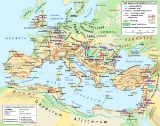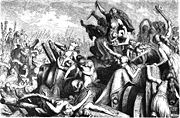
Teutons
Encyclopedia

Greece
Greece , officially the Hellenic Republic , and historically Hellas or the Republic of Greece in English, is a country in southeastern Europe....
and Roman
Roman Empire
The Roman Empire was the post-Republican period of the ancient Roman civilization, characterised by an autocratic form of government and large territorial holdings in Europe and around the Mediterranean....
authors, notably Strabo
Strabo
Strabo, also written Strabon was a Greek historian, geographer and philosopher.-Life:Strabo was born to an affluent family from Amaseia in Pontus , a city which he said was situated the approximate equivalent of 75 km from the Black Sea...
and Marcus Velleius Paterculus
Marcus Velleius Paterculus
Marcus Velleius Paterculus was a Roman historian, also known simply as Velleius. Although his praenomen is given as Marcus by Priscian, some modern scholars identify him with Gaius Velleius Paterculus, whose name occurs in an inscription on a north African milestone .-Biography:Paterculus belonged...
and normally in close connection with the Cimbri
Cimbri
The Cimbri were a tribe from Northern Europe, who, together with the Teutones and the Ambrones threatened the Roman Republic in the late 2nd century BC. The Cimbri were probably Germanic, though some believe them to be of Celtic origin...
, whose ethnicity is contested between Gauls
Gauls
The Gauls were a Celtic people living in Gaul, the region roughly corresponding to what is now France, Belgium, Switzerland and Northern Italy, from the Iron Age through the Roman period. They mostly spoke the Continental Celtic language called Gaulish....
and Germani. According to Ptolemy
Ptolemy
Claudius Ptolemy , was a Roman citizen of Egypt who wrote in Greek. He was a mathematician, astronomer, geographer, astrologer, and poet of a single epigram in the Greek Anthology. He lived in Egypt under Roman rule, and is believed to have been born in the town of Ptolemais Hermiou in the...
's map, they lived in Jutland
Jutland
Jutland , historically also called Cimbria, is the name of the peninsula that juts out in Northern Europe toward the rest of Scandinavia, forming the mainland part of Denmark. It has the North Sea to its west, Kattegat and Skagerrak to its north, the Baltic Sea to its east, and the Danish–German...
, in agreement with Pomponius Mela
Pomponius Mela
Pomponius Mela, who wrote around AD 43, was the earliest Roman geographer. He was born in Tingentera and died c. AD 45.His short work occupies less than one hundred pages of ordinary print. It is laconic in style and deficient in method, but of pure Latinity, and occasionally relieved by pleasing...
, who placed them in Scandinavia
Scandinavia
Scandinavia is a cultural, historical and ethno-linguistic region in northern Europe that includes the three kingdoms of Denmark, Norway and Sweden, characterized by their common ethno-cultural heritage and language. Modern Norway and Sweden proper are situated on the Scandinavian Peninsula,...
(Codanonia).
Earlier than 100 BC, many of the Teutones, as well as the Cimbri
Cimbri
The Cimbri were a tribe from Northern Europe, who, together with the Teutones and the Ambrones threatened the Roman Republic in the late 2nd century BC. The Cimbri were probably Germanic, though some believe them to be of Celtic origin...
, migrated south and west to the Danube
Danube
The Danube is a river in the Central Europe and the Europe's second longest river after the Volga. It is classified as an international waterway....
valley, where they encountered the expanding Roman Republic
Roman Republic
The Roman Republic was the period of the ancient Roman civilization where the government operated as a republic. It began with the overthrow of the Roman monarchy, traditionally dated around 508 BC, and its replacement by a government headed by two consuls, elected annually by the citizens and...
. During the late 2nd century BC, the Teutones and Cimbri are recorded as passing west through Gaul
Gaul
Gaul was a region of Western Europe during the Iron Age and Roman era, encompassing present day France, Luxembourg and Belgium, most of Switzerland, the western part of Northern Italy, as well as the parts of the Netherlands and Germany on the left bank of the Rhine. The Gauls were the speakers of...
and attacking Roman Italy
Italy
Italy , officially the Italian Republic languages]] under the European Charter for Regional or Minority Languages. In each of these, Italy's official name is as follows:;;;;;;;;), is a unitary parliamentary republic in South-Central Europe. To the north it borders France, Switzerland, Austria and...
. After decisive victories over the Romans
Roman Republic
The Roman Republic was the period of the ancient Roman civilization where the government operated as a republic. It began with the overthrow of the Roman monarchy, traditionally dated around 508 BC, and its replacement by a government headed by two consuls, elected annually by the citizens and...
at Noreia
Battle of Noreia
The Battle of Noreia in 112 BC, was the opening action of the Cimbrian War fought between the Roman Republic and the migrating Proto-Germanic tribes, the Cimbri and the Teutons . It ended in defeat, and near disaster, for the Romans.- Prelude :...
and Arausio
Battle of Arausio
The Battle of Arausio took place on October 6, 105 BC, at a site between the town of Arausio and the Rhône River. Ranged against the migratory tribes of the Cimbri under Boiorix and the Teutoni were two Roman armies, commanded by the proconsul Quintus Servilius Caepio and consul Gnaeus Mallius...
, the Cimbri and Teutones divided forces and were then defeated separately by Gaius Marius
Gaius Marius
Gaius Marius was a Roman general and statesman. He was elected consul an unprecedented seven times during his career. He was also noted for his dramatic reforms of Roman armies, authorizing recruitment of landless citizens, eliminating the manipular military formations, and reorganizing the...
in 102 BC
102 BC
Year 102 BC was a year of the pre-Julian Roman calendar. At the time it was known as the Year of the Consulship of Marius and Catulus...
, and 101 BC
101 BC
Year 101 BC was a year of the pre-Julian Roman calendar. At the time it was known as the Year of the Consulship of Marius and Aquillius...
, ending the Cimbrian War
Cimbrian War
The Cimbrian War was fought between the Roman Republic and the Proto-Germanic tribes of the Cimbri and the Teutons , who migrated from northern Europe into Roman controlled territory, and clashed with Rome and her allies...
. The Teutones defeat was at the Battle of Aquae Sextiae
Battle of Aquae Sextiae
The Battle of Aquae Sextiae took place in 102 BC. After a string of Roman defeats , the Romans under Gaius Marius finally defeated the Teutones and Ambrones.-The battle:...
(near present-day Aix-en-Provence
Aix-en-Provence
Aix , or Aix-en-Provence to distinguish it from other cities built over hot springs, is a city-commune in southern France, some north of Marseille. It is in the region of Provence-Alpes-Côte d'Azur, in the département of Bouches-du-Rhône, of which it is a subprefecture. The population of Aix is...
).
Mass suicide of Teuton women
According to Valerius MaximusValerius Maximus
Valerius Maximus was a Latin writer and author of a collection of historical anecdotes. He worked during the reign of Tiberius .-Biography:...
and Florus
Florus
Florus, Roman historian, lived in the time of Trajan and Hadrian.He compiled, chiefly from Livy, a brief sketch of the history of Rome from the foundation of the city to the closing of the temple of Janus by Augustus . The work, which is called Epitome de T...
(who both lived much later), the Teuton King, Teutobod
Teutobod
Teutobod was King of the Teutons. In the late 2nd century BC, together with their neighbours, allies and possible relatives, the Cimbri, the Teutons migrated from their original homes in southern Scandinavia and on the Jutland peninsula of Denmark, south into the Danube valley, southern Gaul and...
, was taken in irons after their defeat. By the conditions of the surrender, three hundred married women were to be handed over in slavery to the Romans. When the Teuton matrons heard of this stipulation, they first begged the consul that they might be set apart to minister in the temples of Ceres and Venus; then, when they failed to obtain their request and were removed by the lictors, they slew their children and next morning were all found dead in each other's arms having strangled themselves in the night. This act passed into Roman legends of Germanic heroism.
Source
-->- Fick, August, Alf Torp and Hjalmar Falk: Vergleichendes Wörterbuch der Indogermanischen Sprachen. Part 3, Wortschatz der Germanischen Spracheinheit. 4. Aufl. (Göttingen: Vandenhoeck and Ruprecht), 1909.
See also
- TheodiscaTheodisca, the Latinised form of a Germanic word meaning "vernacular" or "of the people", is a Middle Latin adjective referring to the Germanic vernaculars of the Early Middle Ages. The Old High German language in Latin sources of the time is referred to as . It also appears as theudiscus, theotiscus,...
- Furor TeutonicusFuror TeutonicusFuror Teutonicus is a Latin phrase referring to the proverbial fierceness of the Teutones, or more generally the Germanic tribes of the Roman Empire period....
- TeutonicTeutonicTeutonic or Teuton may refer to:*the Teutons* Germanic peoples , see Theodiscus**Teutonic Mythology** Germanic languages * Having qualities related to Modern Germans*Nordic race*Furor Teutonicus...
- List of Germanic peoples

